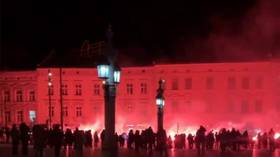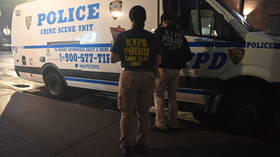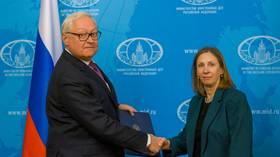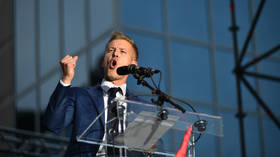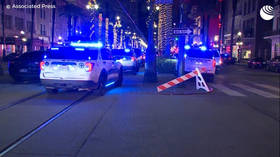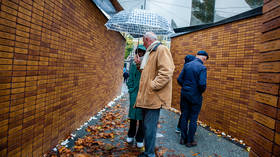'Street thuggery became major tool of regime change in Ukraine’
We are dealing with a clear attempt to undermine the constitutional order of Ukraine through use of street violence and mob rule as a means of regime change, Srdja Trifkovic, foreign affairs editor at Chronicles magazine, told RT.
Tensions remained high in Kiev after on January 18-19 a peaceful demonstration turned into violent clashes with the police. The unrest was acknowledged to be unleashed by the most aggressive group of protesters – Ukrainian nationalists.
Libor Roucek, member of the European Parliament, says that the EU strongly condemns the violence but does express support for peaceful demonstrations in Ukraine.
“We don’t support the violence, but we do support not only in Ukraine, not only in Europe – everywhere in the world – peaceful expression of human rights,” he told RT. “Today [on Monday] there was a meeting of ministers of foreign affairs, saying that we don’t support the violence,” he added.
On the contrary, foreign affairs editor at Chronicles magazine, Srdja Trifkovic, says that “now we are dealing with significant group of highly committed people who are hell-bent on regime change through street thuggery,” criticizing the EU for double standards.
“In fact, what we are dealing with is a clear attempt to undermine the constitutional order of a major European state and it is truly shocking for European parliamentarians to say they are still supportive of a process that obviously wants to use street violence and mob rule as a means of regime change,” Trifkovic told RT.
Trifkovic also criticizes the EU position concerning the legitimacy of Yanukovich’s power, saying that if the EU claims that Yanukovich has lost legitimacy, “what’s about Silvio Berlusconi who was under criminal investigation for the best part of 10 years that he was in power as Italy’s prime minister.”

Though Roucek agreed that there were presidential elections in Ukraine three years ago, and these elections were recognized as free and fair, saying that if there has to be a change of government, it has to be done through the elections. He claimed that “it’s up to the Ukrainian people to decide what do they want: association agreement or whether they want closer relations with Russia.”
“President Yanukovich had the mandate to negotiate the deeper and comprehensive trade agreement; at the last moment under Russian [pressure] he withdrew from it, and that’s the reaction of the [Ukrainian] people,” he said, adding his opinion that the only possible solution for the Ukrainian crisis lies through dialogue.
“The dialogue is needed in Rada, in Parliament, and especially [it] is needed between the government and the opposition, the representatives of the opposition who are present in Parliament. And through dialogue everything has to be discussed, not through violence,” Roucek told RT.
While Roucek blames Russia for pressurizing Ukraine to refuse the association agreement with the EU, Trifkovic argues that Yanukovich saved his country form “a horrible deal”.
“We are looking at a clear-cut situation where Yanukovich was perfectly within his rights to say “no” to a horrible deal, which, had it gone ahead, would have cost Ukraine tens of billions of euros that it could have not afforded, when Russia came in with a 15 billion rescue package; and it’s simply that Europe wanted to have free access to the Ukrainian market for nothing. It was geopolitical all along,” Trifkovic told RT.
Srdja Trifkovic assumed that in the end “most Ukrainians will realize which side their bread is buttered and that the deal with Russia was connected not only with economics but with long-term traditional, spiritual and cultural links.”
The statements, views and opinions expressed in this column are solely those of the author and do not necessarily represent those of RT.
The statements, views and opinions expressed in this column are solely those of the author and do not necessarily represent those of RT.



